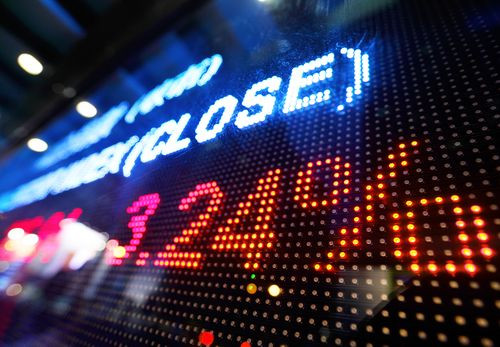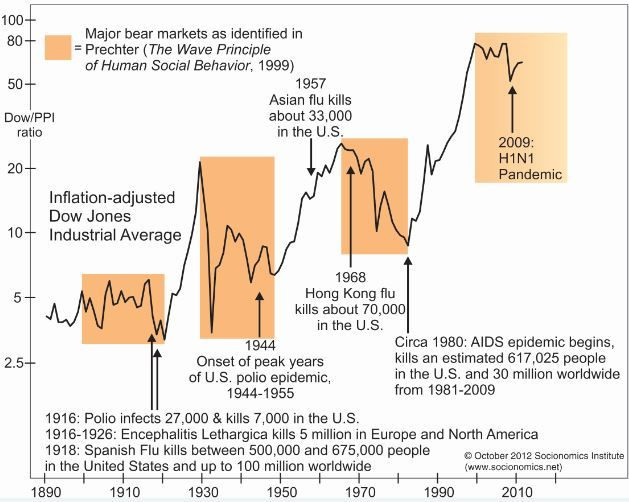Infectious Disease, Fear, And The Stock Market: How Panic Causes Health And Economic Collapse

Fear may be one of the leading causes of the spread of disease, and researchers from the Socionomics Institute examined the connections between trends in social moods and disease. They published their study, “Ebola: A Socionomic Booster Shot,” revealing how fear, the stock market, and the Ebola outbreak are related.
"You can monitor trends in social mood through the stock market, which instantaneously records investor optimism and pessimism about the future," Alan Hall, a researcher from the Socionomic Institute, told Medical Daily, adding.:
Stock data go back three centuries, and history shows that trends toward negative social mood drive society-wide increases in pessimism and fear of the future. Major epidemics tend to follow major trends toward negative social mood, and they often erupt near lows in that society’s stock market. This means that outbreaks tend to occur in societies that are already stressed out. That knowledge may help alleviate personal feelings of stress and anxiety.
A society’s susceptibility to epidemic outbreaks increases the longer they remain fearful and pessimistic. With the recent Ebola outbreak that erupted throughout western Africa in March 2014, it has spread rapidly throughout four other countries in a pattern that follows the stock market. It took six years of a negative social mood to create the right conditions for disease spread, and when Ebola hit the news, it spread fear like wildfire. Social mood theory is the basis for the new science of socionomics, which holds that social mood drives events, not the other way round. Social mood fluctuates between positive and negative poles, producing optimism and confidence, and then pessimism and fear, respectively. The crowd’s opinions and fears become as contagious as the virus itself and cross country borders to weave themselves into our lives.

Ebola virus disease (EVD) is a severe and often fatal disease that kills 90 percent of those it infects, according to the World Health Organization (WHO). The natural host of the virus is fruit bats, which travels from wild animals to humans and continues through human-to-human transmission. It starts off with flu-like symptoms and progressively worsens to hemorrhagic symptoms, such as bleeding out of the eyes, through the gums, and ears. There is neither treatment nor a vaccine available for people or humans to use, and countries are afraid of it spreading into their territories. More than 2,600 people have been infected in Liberia, Guinea, Sierra Leone, and Nigeria since December 2012 and nearly 1,500 have died.
It seems Ebola has come out of nowhere, but the timing of the epidemic makes sense for researchers at the Socionomics Institute. The same fear that makes people sell their stocks also leads them to a susceptibility to public health problems, such as diseases, according to the records of three centuries of stock market data and the history of disease outbreak. The longer we’re depressed, pessimistic, and fearful, the more our stock market drops into a bear market and the more a society becomes susceptible to an epidemic.
"One of CDC Director Sheehan’s main points in a recent interview was simply that people in Ebola-infected regions need to be taught not to touch the dead," Hall said. "As to tactics, there’s an old adage in the stock market that in a bull market, a rising trend will bail out your mistakes. In a bear market, given a falling trend, what can go wrong usually does. That in general applies here. In a bull market, when planning ahead for an epidemic would be most effective, society at large is fairly uninterested in doing so because complacency takes hold, and people are not really worried about a major outbreak."
The same day the WHO announced the strain of Ebola was the most lethal type, the disease began to move faster than health leaders’ efforts to slow it down, which increased the spread. It became clear there was a link between fearfulness and disease containment in April, when an angry mob accused health care workers of bringing Ebola into their town and then attacked the treatment center. Just last month, there was another attack, and 29 infected patients fled from the armed men that attacked the treatment clinic.
"But as a negative mood trend takes hold, a complacent, unprepared social environment presents a public health risk," Hall saild. "In a bear market, as mood is trending negatively, efforts to quell fear tend to appear ineffective and inept, and in many cases they are.We think media are more likely to reflect fear in fearful times and confidence in confident times. Positive social mood makes it easier to quell fear about an epidemic. A quick look at history is instructive. Major epidemics tend to erupt during bear markets, but a couple of them have emerged during bull markets or early enough in bear markets that mood was still relatively elevated."
Analysts at Market Watch predict a bear market is on its way, which means the United States will become more susceptible to an outbreak. The social mood of the U.S. has been trending negatively since 2000 based on the Dow Jones’ value in gold, though positive increase in stocks signal that mood is still relatively elevated, which could lessen our vulnerability.



























